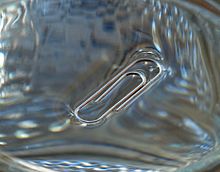I am doing my experiment on the surface tension of the water. How to show the decrease of surface tension of water with the increase in the concentration of salt? Is there any salt that lowers the surface tension of the water?
-
$\begingroup$ Related (though it doesn't quite answer your question): chemistry.stackexchange.com/questions/49570/… $\endgroup$– Ivan NeretinCommented Aug 29, 2020 at 16:33
-
$\begingroup$ This one answers your question: chemistry.stackexchange.com/questions/134948/…. Technically, I guess Sodium Lauryl Sulphate would count as a salt (it's a cation-anion pair). $\endgroup$– Aniruddha DebCommented Aug 29, 2020 at 16:51
-
1$\begingroup$ Soap is a salt as well. $\endgroup$– AlchimistaCommented Aug 30, 2020 at 8:16
-
1$\begingroup$ Does this answer your question? Effect of solutes on surface tension $\endgroup$– M.A.R.Commented Aug 30, 2020 at 11:29
1 Answer
Cetyltrimethylammonium bromide (CTAB) and its cheaper chloro homologue are just two examples of cationic detergents commercially available and frequently used e.g., for hair shampoos. They are called cationic because beside lipophilic alkyl groups their head group is positively charged:
(source)
Note, there equally are anionic and nonionc detergents, too.
There are multiple approaches to demonstrate their effect to lower the surface tension of water. Just a qualitative illustration is placing carefully a paper clip on water which will sink after the addition of a detergent:
(source)
If you are up to quantify the effect, the measurement of the contact angle between the liquid and the solid is a frequently used approach. Again, the Journal of Chemical Education (2017JChemEduc230) published a lab class showcasing the relevance of surface tension e.g., when spraying leaves of lettuce. A second nice demonstration I recall from this journal was to record the rising meniscus in pasteur pipettes (2016JChemEduc1647) in variation of the concentration of sodium dodecyl sulfate (a popular anionic surfactant).


